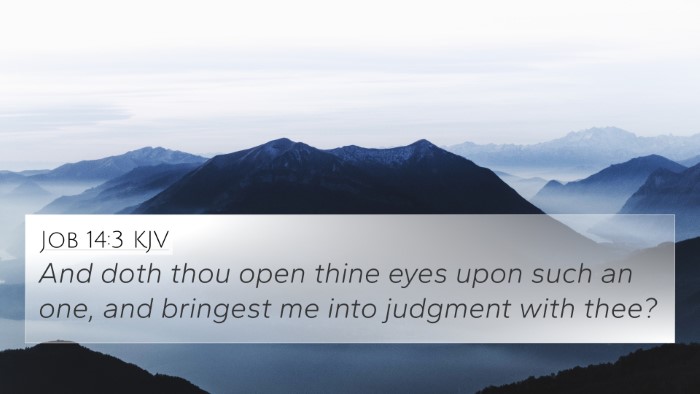Old Testament
Genesis Exodus Leviticus Numbers Deuteronomy Joshua Judges Ruth 1 Samuel 2 Samuel 1 Kings 2 Kings 1 Chronicles 2 Chronicles Ezra Nehemiah Esther Job Psalms Proverbs Ecclesiastes Song of Solomon Isaiah Jeremiah Lamentations Ezekiel Daniel Hosea Joel Amos Obadiah Jonah Micah Nahum Habakkuk Zephaniah Haggai Zechariah MalachiJob 13:25 Similar Verses
Job 13:25 Cross References
Wilt thou break a leaf driven to and fro? and wilt thou pursue the dry stubble?
Uncover the Rich Themes and Topics of This Bible Verse
Listed below are the Bible themes associated with Job 13:25. We invite you to explore each theme to gain deeper insights into the Scriptures.
Job 13:25 Cross Reference Verses
This section features a detailed cross-reference designed to enrich your understanding of the Scriptures. Below, you will find carefully selected verses that echo the themes and teachings related to Job 13:25 KJV. Click on any image to explore detailed analyses of related Bible verses and uncover deeper theological insights.

Leviticus 26:36 (KJV) »
And upon them that are left alive of you I will send a faintness into their hearts in the lands of their enemies; and the sound of a shaken leaf shall chase them; and they shall flee, as fleeing from a sword; and they shall fall when none pursueth.

1 Samuel 24:14 (KJV) »
After whom is the king of Israel come out? after whom dost thou pursue? after a dead dog, after a flea.

Job 14:3 (KJV) »
And doth thou open thine eyes upon such an one, and bringest me into judgment with thee?

Isaiah 17:13 (KJV) »
The nations shall rush like the rushing of many waters: but God shall rebuke them, and they shall flee far off, and shall be chased as the chaff of the mountains before the wind, and like a rolling thing before the whirlwind.

Matthew 12:20 (KJV) »
A bruised reed shall he not break, and smoking flax shall he not quench, till he send forth judgment unto victory.
Job 13:25 Verse Analysis and Similar Verses
Understanding Job 13:25
Job 13:25 states: "Will you frighten a leaf driven to and fro? And will you pursue the dry stubble?" This verse, part of Job's profound dialogue with his friends, encapsulates the essence of fear and helplessness in the face of divine judgment.
Verse Analysis
In Job 13:25, Job uses a rhetorical question to direct attention to the fragile and transient nature of human life compared to the relentless power of God. The imagery of a leaf and stubble signifies how insignificant man's struggles can seem when faced with the Almighty.
Commentary Insights
Insights from prominent biblical commentators highlight several themes within this verse:
- Matthew Henry: Henry emphasizes that Job’s desperation is palpable. He points out that the mention of a leaf, which is easily blown about, reflects Job’s understanding of his own powerless state before God’s will.
- Albert Barnes: Barnes elaborates on the metaphor of stubble, indicating that Job feels like something easily cast aside without significance, which ties into his larger argument about human suffering.
- Adam Clarke: Clarke suggests that the fierce nature of God’s judgment is too great for Job to bear, and warns against seeing God’s actions as merely punitive without understanding their larger purpose.
Keywords and Themes
This verse connects deeply with themes of fear, vulnerability, and divine authority. The usage of the leaf and stubble not only symbolizes physical frailty but also serves as a larger metaphor for humanity's fleeting existence.
Cross-References for Job 13:25
Finding cross-references is essential for a deeper understanding of the scriptures. The following verses relate closely to Job 13:25:
- Job 7:7: "Oh remember that my life is but a breath!" – Emphasizes the transient nature of life.
- Isaiah 40:6-8: "All flesh is grass..." – A reminder of the impermanence of human life.
- Psalm 102:11: "My days are like a shadow that declineth..." – A similar theme of life's fleeting moment.
- James 4:14: "For what is your life? It is even a vapor..." – The New Testament echoes Job's sentiments on human frailty.
- Psalm 144:4: "Man is like a breath; his days are like a passing shadow." – Another testament to the transient experience of life.
- Proverbs 27:1: "Do not boast about tomorrow, for you do not know what a day may bring." – Connects to the unpredictability of life.
- Ecclesiastes 1:14: "I have seen all the works that are done under the sun; and, behold, all is vanity and vexation of spirit." – A perspective on life’s ultimate meaninglessness.
- Matthew 10:29: "Are not two sparrows sold for a penny? And not one of them will fall to the ground apart from your Father." – God’s awareness of His creation contrasts with the fragility of life.
Thematic Connections
Job's feelings express a profound theme prevalent throughout scripture: the anxiety of human existence juxtaposed with divine sovereignty. Exploring these themes through cross-referencing enhances our understanding and reveals deeper biblical truths.
How to Use Bible Cross References
Utilizing a cross-reference system can enhance one’s study significantly. Here are some methods to consider:
- Study Bibles: Many study Bibles come equipped with cross-referencing tools already laid out in the margins.
- Bible Concordances: These resources help identify related verses and expand upon themes interwoven throughout the text.
- Topical Guides: By using a topical Bible or guide, users can find verses that relate to specific themes or subjects.
- Online Bible Tools: Websites and applications dedicated to Bible study often offer dynamic cross-reference features.
Conclusion
Job 13:25 stands as a poignant reminder of human fragility in the face of divine majesty. Through careful examination and cross-referencing with related passages, we uncover rich themes reflecting life's ephemerality under God's sovereign gaze. This verse invites believers to reflect on their position in the broader narrative of scripture, connecting their struggles with Job's lamentation, echoing timeless truths found throughout the Bible.



